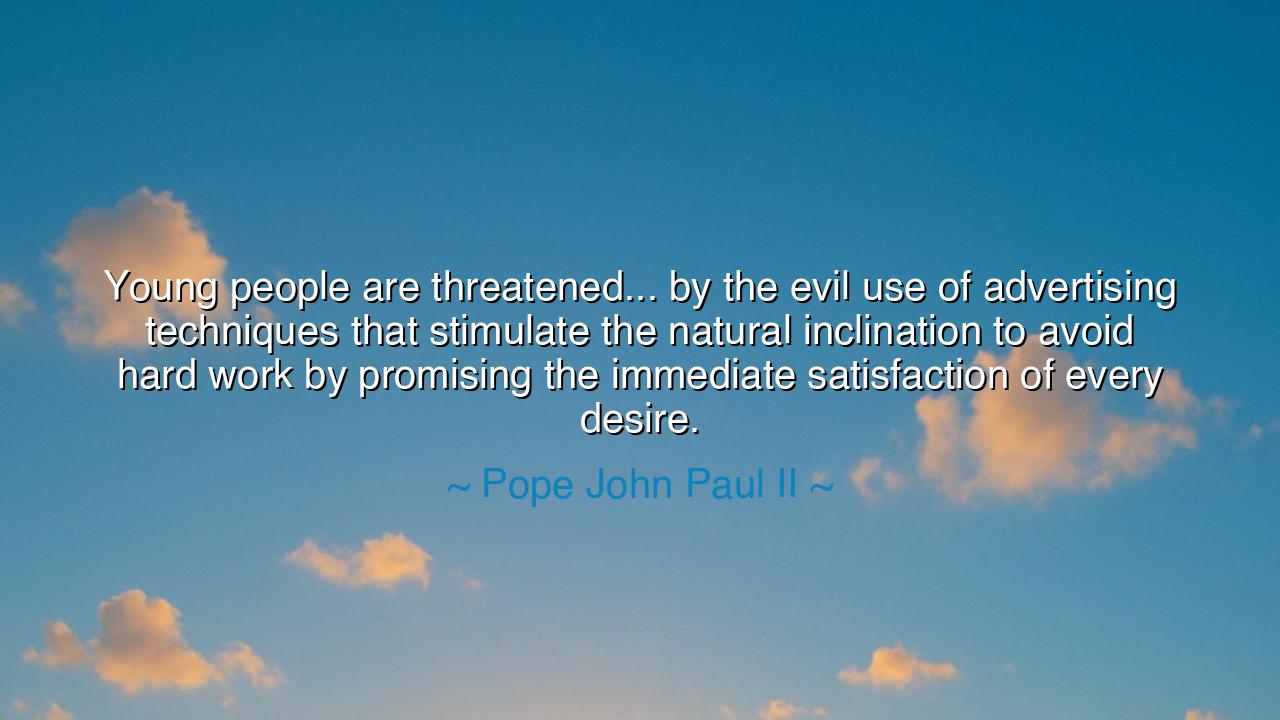
Young people are threatened... by the evil use of advertising
Young people are threatened... by the evil use of advertising techniques that stimulate the natural inclination to avoid hard work by promising the immediate satisfaction of every desire.






In the age of temptation and distraction, Pope John Paul II warns of a great peril facing the youth when he declares, “Young people are threatened… by the evil use of advertising techniques that stimulate the natural inclination to avoid hard work by promising the immediate satisfaction of every desire.” These words strike like a bell of warning across generations. They reveal that the danger is not merely external, but rooted deep within the human heart — a battle between effort and ease, between discipline and indulgence.
The natural inclination to avoid hard work has always existed, for within every soul lies the yearning for comfort and the escape from struggle. In ancient times, this weakness was tempered by necessity and community. But now, in the modern age, it is stimulated and magnified by powerful forces. Through alluring images and persuasive words, advertising techniques whisper false promises, offering joy without effort and fulfillment without sacrifice. These illusions lead the young into chains unseen, binding their spirits with desires that can never be fully satisfied.
The promise of immediate satisfaction is the most dangerous snare of all. It teaches the youth to grasp at shadows rather than build lasting strength. True happiness, as the sages have always taught, comes not from indulging every desire, but from the steady growth that arises through toil, patience, and self-mastery. When this path is abandoned, the heart grows restless, and the soul becomes captive to endless craving.
The origin of this struggle is as old as humanity. From the marketplaces of ancient cities to the glowing screens of the modern world, rulers and merchants alike have sought to shape the will of the people through spectacle and persuasion. In times past, stories and songs were used to inspire virtue; now, these same tools are twisted toward greed and manipulation. Pope John Paul II’s words are a call to awaken — to see through the illusion and reclaim the power of choice.
Thus, let this teaching endure for generations: guard the hearts of the young people, for they are the builders of tomorrow. Resist the evil use of advertising, and do not trade the slow and noble path of hard work for the fleeting mirage of easy pleasure. For only through discipline and courage can one find true freedom — a freedom that no deceiver, however cunning, can ever take away.






NNNgoan ngoan
Pope John Paul II’s statement is so relevant in today’s world of online shopping and fast-food culture. The temptation of instant satisfaction can definitely hinder young people from understanding the importance of hard work. But is it possible to strike a balance between enjoying the benefits of modern convenience while still teaching the value of effort and perseverance? How do we help young people understand that not everything worth having comes easily?
VVuthuthuhang
This quote speaks to a much larger issue—how advertising not only influences consumer behavior but also affects mindset. By promising instant rewards, is society forgetting the true value of struggle and effort? Does this contribute to a culture of impatience? I wonder how we can shift this narrative, especially for younger generations, to help them appreciate that hard work and delayed gratification lead to deeper and more fulfilling rewards in the long run.
Cchiharu
I agree with the Pope’s concern about how advertising manipulates desires. It’s like we’re being conditioned to avoid the hard work and persistence required for long-term goals. But does this mindset impact other areas of life beyond work—like relationships, health, or personal development? How do we create a society where young people are encouraged to put in effort and persevere, despite the temptation of quick rewards?
UGUser Google
Pope John Paul II’s warning about the dangers of advertising is especially relevant today. With social media and instant access to products and services, it’s so easy to give in to the desire for immediate satisfaction. But how do we teach the importance of delayed gratification and the rewards that come from hard work? Does the responsibility lie with the individual, the society, or the companies themselves to change this culture?
T135.Ngo Phuong Thao 12A13
This quote really makes me think about the power of advertising and how it shapes the expectations of young people. The idea that advertising encourages instant gratification is spot on. But I wonder, is it possible to fight against this tendency in a world where everything is marketed to promise quick results? How can we help young people understand the value of hard work when they are constantly bombarded by messages of instant satisfaction?